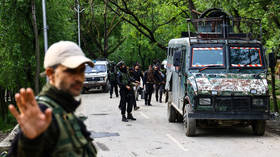Pakistan did ‘dirty work’ for the West in supporting terrorists – defense minister

Pakistani Defense Minister Khawaja Asif has called out the West – and the US in particular – for its role in security tensions in the region. Asked about his country’s support for terrorism in an interview with Sky News released on Friday, Asif admitted that Islamabad did “the dirty work” for the Western powers for decades.
“We have been doing this dirty work for the United States for about three decades, you know and the West, including Britain,” Asif told the British broadcaster on Thursday. He added that this “was a mistake” and Pakistan has “suffered for that.”
“If we had not joined the war against the Soviet Union and the war after 9/11, Pakistan’s track record would have been unimpeachable,” Asif said. He was referring to the Soviet-Afghan war, during which the US covertly supported anti-communist insurgents, and the US-led ‘War on Terror’ that was launched by then-President George W. Bush following the September 11, 2001 attacks and which targeted the Taliban and Al-Qaeda.
Asif claimed the West has long used terrorist groups as proxies, noting that many now labeled as terrorists were once welcomed in Washington.
“When we were fighting the war on their side, way back in the ‘80s against the Soviet Union, all these terrorists of today, they were wining and dining in Washington… They were treated like VIPs in those days,” he said.
The minister suggested that groups considered terrorists in the region are not distinct entities but part of a single organization with a shared religious ideology. “They’re all mixed up. They’re not multiple organizations. They’re just one single organization, religiously organized, and with different faces, different leadership. At times they work together, at times they fight with each other.”
Asif went on to say that “no country in the world has suffered so much from terrorism as Pakistan,” and accused India of following “a pattern” of blaming Pakistan for terrorist attacks on its soil.
The minister’s remarks came amid an escalation between Islamabad and New Delhi, which followed a deadly attack in Indian-administered Kashmir that left 26 people dead earlier this week.
The Resistance Front, a militant group believed to be linked to the Pakistan-based Lashkar-e-Taiba, has reportedly claimed responsibility, prompting New Delhi – which has long accused Pakistan of aiding militant infiltrations in the region – to signal that it holds Islamabad indirectly responsible.
Asif, however, claimed that Islamabad has “never heard of” the organization, while the Lashkar-e-Taiba “no longer exists.” He said it was simply “very convenient” for the “big powers to blame Pakistan for whatever is happening in this region.”
Asif also suggested the Kashmir incident was a “false flag” operation. When asked what would happen if the current standoff with India escalated to the point of airstrikes, he warned Islamabad would “retaliate in kind.”
Thailand: Muslims open fire on Buddhist monks,
murder one novice monk
The “separatist movement” is an Islamic jihad to detach the predominantly Muslim southern region of Thailand from the Buddhist rest of the country.
ISOC reveals motive behind Songkhla attack that killed one novice monk and injured two others
Nation Thailand, April 23, 2025 (thanks to The Religion of Peace):
The Internal Security Operations Command (ISOC) has revealed the underlying cause behind the recent shooting that targeted Buddhist monks and novices in Saba Yoi district, Songkhla province, resulting in the death of one novice and injuries to two others.
The attack occurred on Tuesday (April 22) morning, when assailants opened fire on a 4-door pickup truck driven by Pol Lt Watthana Chumapan, a police officer from Saba Yoi Police Station. The vehicle was transporting six monks and novices on their morning alms round.
Novice monk Wongsakorn, 16, Watthana’s son, succumbed to his injuries, while novice monk Phokanit, 12, and senior monk Boonsong, 70, sustained minor injuries.
Lt Gen Surathep Nukaew, Director of Coordination Centre 5 under ISOC, on Wednesday revealed that the shooting could be linked to a recent wave of violence targeting civilians in the Southern region.
According to Surathep, the violence stems from the April 18 shooting of Abdulroning Latheh, a former ustaz (Islamic teacher), in Su-Ngai Kolok district, Narathiwat province. Following his death, misinformation spread rapidly through both word-of-mouth and online channels associated with separatist movements, alleging state involvement due to Latheh’s past record with security agencies.
“After Latheh was shot, false narratives quickly emerged blaming the authorities,” explained Surathep. “This misinformation campaign was part of an internal rift within the BRN separatist movement — a power struggle between old and new leadership factions. The conflict led to retaliatory attacks, particularly targeting Buddhists, as a provocative response.”…



No comments:
Post a Comment